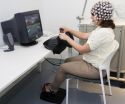(Press-News.org) CAMBRIDGE, Mass. and HARTFORD, Conn. – June 27, 2014 – Research published today in the American Journal of Managed Care demonstrates that analysis of patient records using state-of-the-art data analytics can predict future risk of metabolic syndrome. More than a third of the U.S. population has metabolic syndrome, a condition that can lead to chronic heart disease, stroke and diabetes. These conditions combine to account for almost 20 percent of overall health care costs in the U.S. The study was conducted by Aetna (NYSE: AET) and GNS Healthcare Inc. (GNS), a leading provider of big data analytics products and services in health care.
"This study demonstrates how integration of multiple sources of patient data can help predict patient-specific medical problems," said lead author Dr. Gregory Steinberg, head of clinical innovation at Aetna Innovation Labs. "We believe the personalized clinical outreach and engagement strategies, informed by data from this study, can help improve the health of people with metabolic syndrome and reduce the associated costs."
"The breakthrough in this study is that we are able to bring to light hyper-individualized patient predictions, including quantitatively identifying which individual patients are most at risk, which syndrome factors are most likely to push that patient past a threshold, and which interventions will have the greatest impact on that individual," said Colin Hill, co-founder and CEO of GNS. "The GNS automated data analytics platform paired with Aetna's deep clinical expertise produced these results on extremely large datasets in just three months, a testament to the ability of both groups."
GNS analyzed data from nearly 37,000 members of one of Aetna's employer customers who had voluntarily participated in screening for metabolic syndrome. The data analyzed included medical claims records, demographics, pharmacy claims, lab tests and biometric screening results over a two-year period. For this study, the Aetna and GNS teams utilized two distinct analytical models:
A claims-based-only model to predict the probability of each of the five metabolic syndrome factors occurring for each study subject.
A second model based on both claims and biometric data to predict whether each study subject is likely to get worse, improve or stay the same for each metabolic syndrome factor.
Both analytical models predicted future risk of metabolic syndrome on both a population and an individual level, with ROC/AUC (receiver operating characteristic/area under the curve) varying from 0.80 and 0.88. The researchers were able to develop detailed risk profiles for individual participants, enabling a deep understanding of exactly which combination of the five metabolic syndrome factors each of the study subjects exhibit and are at risk for developing. For every Aetna member whose data was used in the study, the researchers used a scale that measures the percentage risk that individuals have of exhibiting each of the five metabolic syndrome factors. For example, in an individual patient who exhibited two of the five risk factors, researchers could predict which third factor is the most likely to develop.
The analytical models also helped identify individual variable impact on risk associated with adherence to prescribed medications, as well as adherence to routine, scheduled outpatient doctor visits. A scheduled, outpatient visit with a primary care physician lowers the one-year probability of having metabolic syndrome in nearly 90 percent of individuals. In addition, the study found that improving waist circumference and blood glucose yielded the largest benefits on patients' subsequent risk and medical costs.
INFORMATION:
About Metabolic Syndrome
Metabolic syndrome is a group of risk factors: large waist size, high blood pressure, high triglycerides, low high-density lipoprotein (HDL)—or "good"—cholesterol and high blood sugar. Patients who exhibit three of these five factors are classified as having metabolic syndrome. Individuals who have metabolic syndrome are twice as likely to have a heart attack or stroke and are five times as likely to develop diabetes as those who do not. The rate of metabolic syndrome is on the rise, with over a third of U.S. adults having the condition. The chronic diseases that metabolic syndrome can lead to–heart disease, stroke and diabetes–together cause nearly 800,000 deaths per year in the U.S., alone. These diseases cost the health care system more than half a trillion dollars, or almost 20 percent of the $2.7 trillion the U.S. Centers for Disease Control and Prevention cites as the total cost of national health expenditures. (Sources: American Heart Association and American Diabetes Association)
About GNS Healthcare
GNS Healthcare is a big data analytics company that empowers payers, providers and pharmaceutical companies to make intelligent data-driven decisions. We unlock knowledge within complex data, enabling personalized, actionable predictions and precision targeting. For 15 years, GNS has been committed to developing and deploying the most sophisticated mathematical and computational platforms to help our partners improve health and reduce costs. http://www.GNSHealthcare.com
About Aetna
Aetna is one of the nation's leading diversified health care benefits companies, serving an estimated 44 million people with information and resources to help them make better informed decisions about their health care. Aetna offers a broad range of traditional, voluntary and consumer-directed health insurance products and related services, including medical, pharmacy, dental, behavioral health, group life and disability plans, and medical management capabilities, Medicaid health care management services, workers' compensation administrative services and health information technology products and services. Aetna's customers include employer groups, individuals, college students, part-time and hourly workers, health plans, health care providers, governmental units, government-sponsored plans, labor groups and expatriates. For more information, see http://www.Aetna.com and the 2014 Aetna story about how Aetna is helping to build a healthier world.
Company Contacts
GNS Healthcare
David Santucci, 617-374-2347
Santucci@GNSHealthcare.com
Aetna
Ethan Slavin, 860-273-6095
SlavinE@Aetna.com
Media Contact
MacDougall Biomedical Communications
Lynnea Olivarez, 781-235-3060
LOlivarez@MacBioCom.com
AJMC publishes results showing big data analytics can predict risk of metabolic syndrome
Large-scale patient data analytics can help create personalized, early intervention for patients
2014-06-27
ELSE PRESS RELEASES FROM THIS DATE:
Prevention incentives
2014-06-27
A spoonful of sugar helps the medicine go down—and so do movie tickets, cell phone minutes and discounts on airline flights.
A private South African health plan increased patient use of preventive care such as mammograms and influenza vaccine with a program that incentivized healthy behavior using discounts on retail goods and travel. The study, which was led by researchers at Harvard Medical School and the RAND Corporation, was published today in The American Journal of Managed Care.
"Even though most people know that preventive care is important, too few people take ...
Extinct undersea volcanoes squashed under Earth's crust cause tsunami earthquakes, according to new
2014-06-27
New research has revealed the causes and warning signs of rare tsunami earthquakes, which may lead to improved detection measures.
Tsunami earthquakes happen at relatively shallow depths in the ocean and are small in terms of their magnitude. However, they create very large tsunamis, with some earthquakes that only measure 5.6 on the Richter scale generating waves that reach up to ten metres when they hit the shore.
A global network of seismometers enables researchers to detect even the smallest earthquakes. However, the challenge has been to determine which small ...
A study warns of the risk entailed when night owls -- 'evening-type' people -- drive early in the morning
2014-06-27
Researchers from the University of Granada have shown that individual chronotype—that is, whether you are a "morning-type" or an "evening-type", depending on the time of day when your physiological functions are more active—markedly influences driving performance.
In fact, evening-types are much worse drivers—they pay less attention—at their "non-optimal" time of day (early in the morning) by comparison with their optimal time (during the evening). However, in this experiment morning-types were more stable drivers than evening-types and drove relatively well both in the ...
Colon cancer survivors are more likely to have pain in the back and abdomen
2014-06-27
Researchers from the University of Granada have discovered that colon cancer survivors are more likely to suffer future lesions related with pain in the back and lower abdomen than healthy individuals of the same gender and age.
These patients present a series of abnormalities in the abdominal wall architecture—the site of surgery in oncological treatment. Moreover, they have specific abnormalities in processing chronic pain that may increase their sensitization to any kind of pain in the future.
In two articles published in Pain Medicine and the European Journal of ...
'Big data' technique improves monitoring of kidney transplant patients
2014-06-27
A new data analysis technique radically improves monitoring of kidney patients, according to a University of Leeds-led study, and could lead to profound changes in the way we understand our health.
The research, published in the journal PLoS Computational Biology, provides a way of making sense out of the huge number of clues about a kidney transplant patient's prognosis contained in their blood.
By applying sophisticated "big data" analysis to the samples, scientists were able to crunch hundreds of thousands of variables into a single parameter indicating how a kidney ...
Global healthcare is a labour of Hercules
2014-06-27
Einstein once observed that "it is harder to crack prejudice than an atom". If he was right, then Hans Rosling is faced with a labour of Hercules. As Professor of International Health at the Karolinska Institute in Stockholm, he finds himself fighting against the cliché that the world is divided between rich and poor. "This neat division simply no longer exists. The statistics reveal a far more complex picture, with more and more people worldwide living in relative prosperity. This means that in health research in particular it is time for a paradigm shift," says Rosling. ...
Sex hormone levels at midlife linked to heart disease risk in women
2014-06-27
PITTSBURGH, June 27, 2014 – As hormone levels change during the transition to menopause, the quality of a woman's cholesterol carriers degrades, leaving her at greater risk for heart disease, researchers at the University of Pittsburgh Graduate School of Public Health discovered.
The first-of-its-kind evaluation, supported by the National Institutes of Health (NIH), was done using an advanced method to characterize cholesterol carriers in the blood and is published in the July issue of the Journal of Lipid Research.
The results call for further research to evaluate ...
New form of brain signaling affects addiction-related behavior
2014-06-27
University of Iowa researchers have discovered a new form of neurotransmission that influences the long-lasting memory created by addictive drugs, like cocaine and opioids, and the subsequent craving for these drugs of abuse. Loss of this type of neurotransmission creates changes in brains cells that resemble the changes caused by drug addiction.
The findings, published June 22 in the journal Nature Neuroscience, suggest that targeting this type of neurotransmission might lead to new therapies for treating drug addiction.
"Molecular therapies for drug addiction are ...
Homeless alcoholics typically began drinking as children
2014-06-27
WASHINGTON — A phenomenological study offers detailed insights into homeless, alcohol-dependent patients often stigmatized by the public and policymakers as drains on the health care system, showing the constellation of reasons they are incapable of escaping social circumstances that perpetuate and exacerbate their problems The study, published online yesterday in Annals of Emergency Medicine, was conducted at Bellevue Hospital in New York City, which has a long history of service to the city's indigent population.
"One hundred percent of patients enrolled in the study ...
CNIO researchers discover more than 40 melanoma-specific genes that determine aggressiveness
2014-06-27
Researchers from the Spanish National Cancer Research Centre (CNIO) have discovered more than 40 genes that predict the level of aggressiveness of melanoma and that distinguish it from other cancers with a poor prognosis. The discovery, published in Cancer Cell, will help to identify unique aspects of melanoma that could contribute to determine the risk of developing metastasis in patients with this disease. This study is relevant because it explains why a drug, also described by CNIO, is being used to selectively attack the melanoma tumour cells. Melanoma is one of the ...
LAST 30 PRESS RELEASES:
Pekingese, Shih Tzu and Staffordshire Bull Terrier among twelve dog breeds at risk of serious breathing condition
Selected dog breeds with most breathing trouble identified in new study
Interplay of class and gender may influence social judgments differently between cultures
Pollen counts can be predicted by machine learning models using meteorological data with more than 80% accuracy even a week ahead, for both grass and birch tree pollen, which could be key in effective
Rewriting our understanding of early hominin dispersal to Eurasia
Rising simultaneous wildfire risk compromises international firefighting efforts
Honey bee "dance floors" can be accurately located with a new method, mapping where in the hive forager bees perform waggle dances to signal the location of pollen and nectar for their nestmates
Exercise and nutritional drinks can reduce the need for care in dementia
Michelson Medical Research Foundation awards $750,000 to rising immunology leaders
SfN announces Early Career Policy Ambassadors Class of 2026
Spiritual practices strongly associated with reduced risk for hazardous alcohol and drug use
Novel vaccine protects against C. diff disease and recurrence
An “electrical” circadian clock balances growth between shoots and roots
Largest study of rare skin cancer in Mexican patients shows its more complex than previously thought
Colonists dredged away Sydney’s natural oyster reefs. Now science knows how best to restore them.
Joint and independent associations of gestational diabetes and depression with childhood obesity
Spirituality and harmful or hazardous alcohol and other drug use
New plastic material could solve energy storage challenge, researchers report
Mapping protein production in brain cells yields new insights for brain disease
Exposing a hidden anchor for HIV replication
Can Europe be climate-neutral by 2050? New monitor tracks the pace of the energy transition
Major heart attack study reveals ‘survival paradox’: Frail men at higher risk of death than women despite better treatment
Medicare patients get different stroke care depending on plan, analysis reveals
Polyploidy-induced senescence may drive aging, tissue repair, and cancer risk
Study shows that treating patients with lifestyle medicine may help reduce clinician burnout
Experimental and numerical framework for acoustic streaming prediction in mid-air phased arrays
Ancestral motif enables broad DNA binding by NIN, a master regulator of rhizobial symbiosis
Macrophage immune cells need constant reminders to retain memories of prior infections
Ultra-endurance running may accelerate aging and breakdown of red blood cells
Ancient mind-body practice proven to lower blood pressure in clinical trial
[Press-News.org] AJMC publishes results showing big data analytics can predict risk of metabolic syndromeLarge-scale patient data analytics can help create personalized, early intervention for patients


